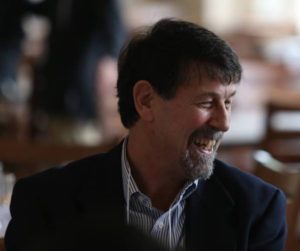 This post is part of our Joureny Forward series. We’ve invited folks from across Mennonite Church USA to reflect on our Journey Forward and consider how they’ve seen Renewed Commitments at work in their lives, their congregation or community. If you’d like to contribute to this series by highlighting stories that bring our shared values to life, email JenniferC@MennoniteUSA.org.
This post is part of our Joureny Forward series. We’ve invited folks from across Mennonite Church USA to reflect on our Journey Forward and consider how they’ve seen Renewed Commitments at work in their lives, their congregation or community. If you’d like to contribute to this series by highlighting stories that bring our shared values to life, email JenniferC@MennoniteUSA.org.
Clyde Kratz is the Executive Conference Minister of Virginia Mennonite Conference. He has served in pastoral assignments in Franconia, Lancaster and Virginia Conferences prior to his current role. He values the relationships that he has with conference and denominational leaders of MC USA. His aspiration for MC USA is to be an empowered denomination seeking to engage in the missional challenges confronting the Church.
Violence, natural disasters and catastrophic events continue to bombard us in the news. An election season’s turbulence with multiply conflicting messages about other individuals is received non-stop on the airwaves of TV advertisements. At the end of the day, I am weary from work, troubled by the loss of human life and challenged by the lack of basic respect for human dignity. What contributes to my own sense of hopefulness about the future?
The “Renewed Commitments for MC USA” is an intriguing expression of our core faith commitments. The commitments are simple, concise, and demanding. Core commitments are: Follow Jesus, Witness to God’s Peace, and Experience Transformation. These core commitments can revitalize our life as postmodern Anabaptist believers and provide us with enduring hope for our future.
The Renewed Commitments for MC USA is a reality check for our hopeful future. It calls each one of us to move beyond our nationalistic fervor, our denominational allegiances and our theological dispositions, to search for the heart of the matter of being a follower of Jesus.
It is an exercise to strip away the codification of traditions that have been handed to us through Sunday school, preaching, educational institutions and even our own study. It is a call to engage in a new discernment about God’s call on our life as we imagine our future together.
I affirm the necessity of being reintroduced to Jesus. Jesus is both a historic tradition and a living word. In Scripture, I discover the encounters that people, in the text and the writer of the text, experienced with Jesus. As one living in the 21st century, I interpret the first century narration of Jesus’ life and ministry into my own experiences. I encounter the living word, the Spirit of God, as I reflect on how those words in Holy Scripture move me to respond to the text. And I also organize my life around the precepts present in my reading and reflection. In humility, I acknowledge that my reading of and reflection on Scripture remains subject to the giving and receiving of counsel from brothers and sisters that I meet in local assembly, in gathered leadership groups and even in international settings. In hope, I reaffirm that Jesus is the center of my faith and I have much to learn as I open myself to the leading of God’s Spirit.
Secondly, I am not prone to monastic endeavors. In other word, I do not find a lot of fulfillment in believing that merely thinking and reflecting is an adequate outgrowth of my commitment to being a follower of Jesus. To be a witness of God’s peace, the second core principle, is an essential component of our life. God’s peace comes in many forms.
 I participated with Mennonite Disaster Service in an experience of building bridges in West Virginia. The bridge connecting the home owner’s property with the road had been washed away by flooding. The bridge was considered personal property and not the responsibility of local or state government. Therefore, the home owner needed to bear the cost of replacing the bridge. Together, the MDS work team constructed a bridge. The following morning, we learned a person living in the home had a medical emergency the very evening we completed it. Members of the rescue squad were grateful for the completed bridge, because it allowed them to carry a very heavy person a few short yards instead of taking the long pathway to the neighbor’s and then across their bridge. A neighbor gave witness to the fact the completed bridge was a miracle of God. It was an instrument that saved a man’s life because of the timely medical treatment he received. The peace that was present in the neighborhood once the bridge was complete gave rise to their own witness, their testimony, about God’s care for them.
I participated with Mennonite Disaster Service in an experience of building bridges in West Virginia. The bridge connecting the home owner’s property with the road had been washed away by flooding. The bridge was considered personal property and not the responsibility of local or state government. Therefore, the home owner needed to bear the cost of replacing the bridge. Together, the MDS work team constructed a bridge. The following morning, we learned a person living in the home had a medical emergency the very evening we completed it. Members of the rescue squad were grateful for the completed bridge, because it allowed them to carry a very heavy person a few short yards instead of taking the long pathway to the neighbor’s and then across their bridge. A neighbor gave witness to the fact the completed bridge was a miracle of God. It was an instrument that saved a man’s life because of the timely medical treatment he received. The peace that was present in the neighborhood once the bridge was complete gave rise to their own witness, their testimony, about God’s care for them.
The final core value is experiencing transformation. Too often, we hope other people will change! As I read this core value, there is the expectation that my encounter with Jesus, the witness of God’s presence in the world, will contribute to my transformation. Helping on the MDS assignment, I realized the inadequacy of community resources for individuals confronting the results of natural disasters that contribute to their vulnerability. God’s Spirit at work in my life has challenged my own sense of independence and self-sufficiency — good values, but limited in terms of the unexpected catastrophic interruptions that occur in our world.
As contemporary Anabaptist-Mennonite believers, let us embrace the “Renewed Commitments for MC USA” and the “Journey Forward Curriculum.” It is our opportunity to reignite our passion as followers of Jesus, witnesses of God’s power in our life, as we experience the transforming presence of God. We may discover the discipline of hope may emerge not only for our local assembly’s future, but also the body of believers known as Mennonite Church USA.
________________________________________________________________
All congregations are invited to use Journey Forward’s “Pathways” study guide. Find it and all Journey Forward updates here.
Your financial support of MC USA helps us equip leaders and tell stories of Anabaptist faith in action across the church. Donate to MC USA here.

